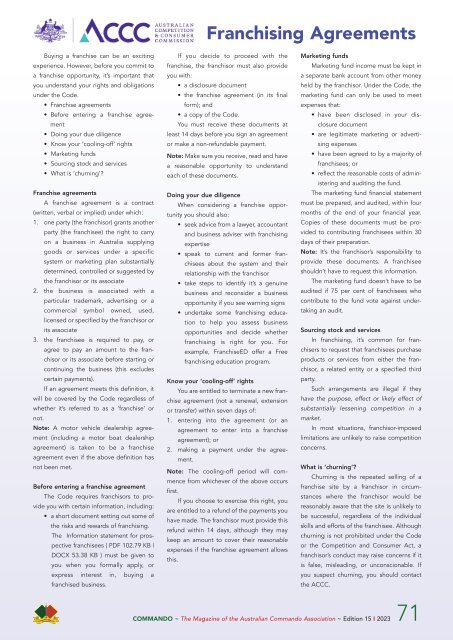OFFICIAL Commando News Magazine Edition 15 2023
The official magazine of the Australian Commandos Association
The official magazine of the Australian Commandos Association
You also want an ePaper? Increase the reach of your titles
YUMPU automatically turns print PDFs into web optimized ePapers that Google loves.
Franchising Agreements<br />
Buying a franchise can be an exciting<br />
experience. However, before you commit to<br />
a franchise opportunity, it’s important that<br />
you understand your rights and obligations<br />
under the Code.<br />
• Franchise agreements<br />
• Before entering a franchise agree -<br />
ment<br />
• Doing your due diligence<br />
• Know your ‘cooling-off’ rights<br />
• Marketing funds<br />
• Sourcing stock and services<br />
• What is ‘churning’?<br />
Franchise agreements<br />
A franchise agreement is a contract<br />
(written, verbal or implied) under which:<br />
1. one party (the franchisor) grants another<br />
party (the franchisee) the right to carry<br />
on a business in Australia supplying<br />
goods or services under a specific<br />
system or marketing plan substantially<br />
determined, controlled or suggested by<br />
the franchisor or its associate<br />
2. the business is associated with a<br />
particular trademark, advertising or a<br />
com mercial symbol owned, used,<br />
licensed or specified by the franchisor or<br />
its associate<br />
3. the franchisee is required to pay, or<br />
agree to pay an amount to the fran -<br />
chisor or its associate before starting or<br />
continuing the business (this excludes<br />
certain payments).<br />
If an agreement meets this definition, it<br />
will be covered by the Code regardless of<br />
whether it’s referred to as a ‘franchise’ or<br />
not.<br />
Note: A motor vehicle dealership agree -<br />
ment (including a motor boat dealership<br />
agreement) is taken to be a franchise<br />
agreement even if the above definition has<br />
not been met.<br />
Before entering a franchise agreement<br />
The Code requires franchisors to pro -<br />
vide you with certain information, including:<br />
• a short document setting out some of<br />
the risks and rewards of franchising.<br />
The Information statement for pros -<br />
pective franchisees ( PDF 102.79 KB |<br />
DOCX 53.38 KB ) must be given to<br />
you when you formally apply, or<br />
express interest in, buying a<br />
franchised business.<br />
If you decide to proceed with the<br />
franchise, the franchisor must also provide<br />
you with:<br />
• a disclosure document<br />
• the franchise agreement (in its final<br />
form); and<br />
• a copy of the Code.<br />
You must receive these documents at<br />
least 14 days before you sign an agreement<br />
or make a non-refundable payment.<br />
Note: Make sure you receive, read and have<br />
a reasonable opportunity to understand<br />
each of these documents.<br />
Doing your due diligence<br />
When considering a franchise oppor -<br />
tunity you should also:<br />
• seek advice from a lawyer, accountant<br />
and business adviser with franchising<br />
expertise<br />
• speak to current and former fran -<br />
chisees about the system and their<br />
relationship with the franchisor<br />
• take steps to identify it’s a genuine<br />
business and reconsider a business<br />
opportunity if you see warning signs<br />
• undertake some franchising educa -<br />
tion to help you assess business<br />
opportunities and decide whether<br />
franchising is right for you. For<br />
example, FranchiseED offer a Free<br />
franchising education program.<br />
Know your ‘cooling-off’ rights<br />
You are entitled to terminate a new fran -<br />
chise agreement (not a renewal, extension<br />
or transfer) within seven days of:<br />
1. entering into the agreement (or an<br />
agreement to enter into a franchise<br />
agreement); or<br />
2. making a payment under the agree -<br />
ment.<br />
Note: The cooling-off period will com -<br />
mence from whichever of the above occurs<br />
first.<br />
If you choose to exercise this right, you<br />
are entitled to a refund of the payments you<br />
have made. The franchisor must provide this<br />
refund within 14 days, although they may<br />
keep an amount to cover their reasonable<br />
expenses if the franchise agreement allows<br />
this.<br />
Marketing funds<br />
Marketing fund income must be kept in<br />
a separate bank account from other money<br />
held by the franchisor. Under the Code, the<br />
marketing fund can only be used to meet<br />
expenses that:<br />
• have been disclosed in your dis -<br />
closure document<br />
• are legitimate marketing or adverti -<br />
sing expenses<br />
• have been agreed to by a majority of<br />
franchisees; or<br />
• reflect the reasonable costs of admin -<br />
is tering and auditing the fund.<br />
The marketing fund financial statement<br />
must be prepared, and audited, within four<br />
months of the end of your financial year.<br />
Copies of these documents must be pro -<br />
vided to contributing franchisees within 30<br />
days of their preparation.<br />
Note: It’s the franchisor’s responsibility to<br />
provide these documents. A franchisee<br />
shouldn’t have to request this information.<br />
The marketing fund doesn’t have to be<br />
audited if 75 per cent of franchisees who<br />
contribute to the fund vote against under -<br />
taking an audit.<br />
Sourcing stock and services<br />
In franchising, it’s common for fran -<br />
chisers to request that franchisees purchase<br />
products or services from either the fran -<br />
chisor, a related entity or a specified third<br />
party.<br />
Such arrangements are illegal if they<br />
have the purpose, effect or likely effect of<br />
substantially lessening competition in a<br />
market.<br />
In most situations, franchisor-imposed<br />
limitations are unlikely to raise competition<br />
concerns.<br />
What is ‘churning’?<br />
Churning is the repeated selling of a<br />
franchise site by a franchisor in cir cum -<br />
stances where the franchisor would be<br />
reasonably aware that the site is unlikely to<br />
be successful, regardless of the individual<br />
skills and efforts of the franchisee. Although<br />
churning is not prohibited under the Code<br />
or the Competition and Consumer Act, a<br />
franchisor’s conduct may raise concerns if it<br />
is false, misleading, or unconscionable. If<br />
you suspect churning, you should contact<br />
the ACCC.<br />
COMMANDO ~ The <strong>Magazine</strong> of the Australian <strong>Commando</strong> Association ~ <strong>Edition</strong> <strong>15</strong> I <strong>2023</strong> 71
















